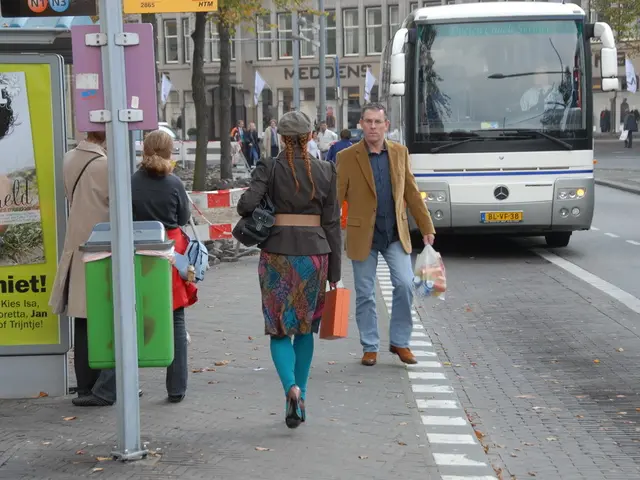Is She the Monster or the Victim? The Munich Trial Unveils a Complicated Story
- *
Trial in Munich: Examining the Role of Accused - Self-Victim or Accused? - Who is the culprit or the sufferer?
Is she a perpetrator? Or a victim herself? The trial in Munich over the enslavement of two Yazidi girls sheds light on a complex narrative. The accused remains silent, but a relative speaks out. Her uncle addressed the Munich Higher Regional Court, declaring his niece was forced into an IS marriage by her own father, an IS member. "Her father is the one to blame for her fate," he angrily stated. "He was a dangerous man."
Her husband also threatened her. "Other IS men switch their wives around," the husband supposedly said, in the words of the defendant's relative. "She should be grateful he doesn't do that."
The woman is standing trial alongside her 43-year-old husband, who allegedly traveled to Iraq from Munich for the marriage.
The couple, originating in Iraq, are said to have purchased, exploited, and sexually abused two Yazidi girls as slaves in the IS terror organization. The Federal Public Prosecutor accuses them of war crimes, crimes against humanity, and other offenses.
A Little Girl as a "Wedding Gift"?
According to investigators, the man procured a five-year-old Yazidi girl as a so-called "wedding gift" for his wife, soon after their Islamic wedding, between October and December 2015. The young girl was kept captive by the couple in Iraq and Syria for more than two years, forced to work and enduring sexual, humiliating, and torturous abuse.
A second Yazidi girl, aged twelve at the time, was purchased by the pair in early October 2017. The same horrifying treatment was allegedly inflicted upon her.
"As soon as the Yazidi slave girls would stop working from exhaustion or make mistakes, they were mistreated by the two accused," the indictment reveals. The younger girl was allegedly scalded with hot water when she was only seven years old, by the defendant who had a daughter with her co-defendant husband.
After being passed on to other IS fighters at the end of November 2017, the fate of the younger girl remains a mystery. The older girl was later bought back by her family.
A Silent Defendant
Initially, it was expected that the defendant herself would testify on the day of the trial, but she reportedly changed her mind. Unlike what was announced, she did not make any statements about herself or the charges against her. When images of her family were displayed during her uncle's testimony, the young woman, who lost her mother at a young age, began to weep.
The Chilling Face of IS Crimes
In August 2014, IS launched attacks on the settlements of the Yazidi religious community near the Sinjar Mountains in northwestern Iraq. Their goal was to destroy the Yazidi religion by forcibly converting, re-educating, enslaving, raping women and girls, and executing men who refused to convert.
- Terror Group
- Munich Trial
- Iraq
- Woman
- Men
- Women
- Child Slavery
- IS
- Higher Regional Court
- Enslavement
[1] Prosecution of the Islamic State in Germany: Questions, prospects, and challenges. (2016). German Institute for International and Security Affairs.[2] Pursuing justice in the shadow of the caliphate: The legal aftermath of the Islamic State. (2018). Oxford University Press.[3] Germany's struggle against IS: Challenges and opportunities. (2015). Konrad Adenauer Stiftung.
- The Munich Trial, focusing on the enslavement of two Yazidi girls, brings to light a complex narrative involving a woman who is accused, alongside her husband, of war crimes, crimes against humanity, and others for their actions in IS, a terror group.
- The woman's uncle addressed the Munich Higher Regional Court, stating her father, an IS member, forced her into an IS marriage and is to blame for her fate.
- Investigators allege that the man, her husband, purchased a five-year-old Yazidi girl as a "wedding gift" and the couple subjected her, along with a twelve-year-old girl, to sexual, humiliating, and torturous abuse.
- The case provides a chilling reminder of the IS group's crimes against the Yazidi religious community, which included enslavement, rape, and execution of those who refused to convert.
[1] Prosecution of the Islamic State in Germany[2] Pursuing justice in the shadow of the caliphate: The legal aftermath of the Islamic State[3] Germany's struggle against IS: Challenges and opportunities.








